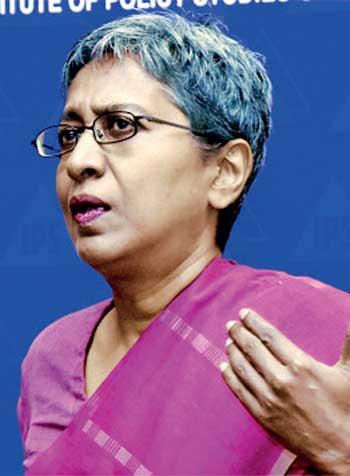09 Oct 2024 - {{hitsCtrl.values.hits}}
 |
| Dr. Dushni Weerakoon -Pic by Nimalasiri Edirisinghe |
By Nuzla Rizkiya
Sri Lanka should stay committed to the fiscal framework set by the International Monetary Fund (IMF) until the country achieves the macroeconomic stability required for a sustained recovery, a top economist asserted.
Despite encouraging signs such as year-on-year inflation averaging 1 percent and four consecutive quarters of positive growth, the country’s output levels are still expected to remain at 2018-2019 levels, even if GDP growth reaches 4 percent by the end of 2024, according to Institute of Policy Studies (IPS) Executive Director Dushni Weerakoon.
“This is the result we have achieved despite a severe economic shock and recessionary conditions,” Weerakoon said during the launch of the IPS annual report, “Sri Lanka: State of the Economy 2024”.
“Looking back to October 2021, just after Covid but before the economic crisis, the IMF’s growth forecast for Sri Lanka shows the extent of the output losses from the 2022 crisis. For developing countries like ours, these losses could be permanent.”
Weerakoon pointed out that the drop in output has contributed to slower job creation, rising poverty, and widening economic disparities, which could become long-term obstacles to development if recovery efforts are not carefully managed.
As policymakers consider how to accelerate the recovery, she said Sri Lanka has two limited options: either fundamentally revise tax and spending policies to meet IMF targets, or make smaller adjustments that preserve the current fiscal framework.
However, Weerakoon cautioned that revisiting IMF targets involves significant risks, such as delays in securing multilateral funding and setbacks to debt sustainability.
“The IMF itself doesn’t bring large sums of money, but it unlocks funding from other institutions like the World Bank and ADB. If we deviate from the IMF programme, these inflows could dry up. If you look at our bilateral official creditors, they are unwilling to even consider haircuts, let alone broader debt forgiveness initiatives. So, these will not provide immediate and urgent, practical relief to a crisis-hit country like ours,” she said.
While ongoing debt restructuring negotiations may offer some breathing room, Sri Lanka must start repaying restructured debt by 2028. The country’s foreign reserves currently cover only about two and a half months of imports, which leave it vulnerable to even minor economic shocks.
Therefore, Weerakoon suggested that the best option is to adhere to the IMF programme to prevent a repeat of the 2022 crisis and maintain the current growth momentum without overheating the economy.
“There are significant risks and high costs for countries if they step out of the IMF programmes that are intended to get you out of these kinds of crises. I think, at this juncture, it is important that we make use of that macroeconomic space to ensure that the recovery process gathers momentum, because growth-boosting structural reforms may be late to materialise or may be delayed as we go through the current political transition,” she said.
08 Jan 2025 35 minute ago
07 Jan 2025 7 hours ago
07 Jan 2025 7 hours ago
07 Jan 2025 8 hours ago
07 Jan 2025 07 Jan 2025